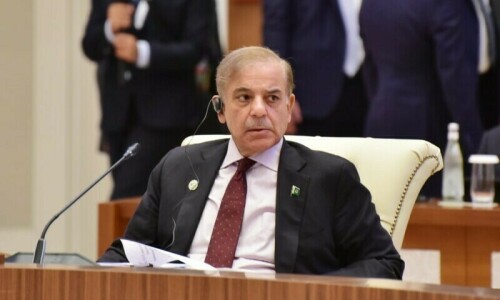WASHINGTON, April 24: A tribal delegation currently visiting Washington has urged the United States to support the jirga process to bring peace to the restive tribal region.
The 10-member delegation from the tribal areas of Pakistan and Afghanistan has been in Washington for more than a week now, meeting senior officials from the White House, State Department and Pentagon.
On Wednesday, US Assistant Secretary of State Richard Boucher confirmed their presence in Washington, saying that they had offered to work with the United States if it supported the peace process.“I just spent an hour, probably an hour and a half, with about 10 representatives of tribes from the border areas of Pakistan and Afghanistan, and the message I got from them is work with us, support the jirga process,” said Mr Boucher.
“We can talk these things out, we can bring people over and we can work with you as necessary where there are violent elements that have to be dealt with.”
The meeting appears to have had a profound impact on Mr Boucher who said that he now understood the need for negotiating with the tribes.
“I would make a distinction between the tribes and the Taliban and Al Qaeda, but negotiating with the tribes, especially, is one of the tactics that needs to be used along with other measures,” he said.
The delegation, however, presented a much more complicated picture of the situation in the tribal zone than the US does. They disagree with the over-simplified US description of the militants as “reconcilable” and “irreconcilable”.
The picture they presented is that of a cobweb of local militants, Pakistani and Afghan Taliban and Arab, Uzbek and other foreign elements who often also fight with each other for influence and power.
The tribal elders suggested reaching out to all, but their description also raises the possibility of isolating the foreign elements from the locals through a peace deal that offers amnesty to those willing to lay down weapons and shun violence.
According to this description, Baitullah Mahsud is the strongest militant leader in the tribal zone.
The tribal delegation insisted that rejecting him as ‘irreconcilable’ will not end the violence.
The elders said that Islamabad had been negotiating a peace deal with Mahsud since February when the military first announced a ceasefire in the area under his control.
South Waziristan’s Mullah Nazir is also a powerful leader while Turkistan Baitni has some influence as well. Both are associated with the local Taliban movement.
Mullah Nazir strongly supports peace talks with Islamabad.
Two other militant leaders in South Waziristan, Khanaan and Sharif, also sympathise with Islamabad.
In North Waziristan, Sadiq Noor and local Taliban leader Gul Bahadur are prominent but Gul Bahadur has accepted Baitullah Mahsud as his amir.
Sadiq Noor and another local militant leader Khaliq Dawar are considered close to Al Qaeda.
Initially, they were not responding to the government’s peace overtures but now both are negotiating a peace deal with Islamabad.
All these local Pashtun tribal leaders, despite their links to the Taliban and Al Qaeda movements, want good relations with Islamabad some are against fighting the Pakistan army.
But the presence of foreign elements in the region complicates the situation.
The strongest among the foreign militants are the Uzbeks, Chechens and Turkmen. There are two to three thousands Central Asians in the two Waziristans, led by Tahir Yuldashev and Najmuddin Uzbek. But the two leaders have their own differences and have been fighting each other as well.
Mullah Nazir ousted the Uzbeks from South Waziristan, forcing them to seek protection in Mahsud’s territory. Tahir Yuldashev is believed to be hiding in Mirali.
Hundreds of Arabs also are hiding in Mirali where they have occupied the houses left behind by Mahsud tribesmen forced to evacuate the area after the recent military operation.Unlike the Uzbeks, who are despised by the local Taliban and tribesmen, the Arabs have good relations with both.
The Arabs are divided into two groups: the Egyptians and the Libyans. Ayman al-Zawahiri, Osama bin Laden’s lieutenant, leads the Egyptians while Abul Laith Libbi leads the Libyans. After his death, Yahya Libbi, who escaped from the Bagram jail two years ago, leads this group.
There are also a small number of Saudis and Arabs from other Middle Eastern countries.
The second strongest group in the region, after Mahsud’s, is the one known as the Punjabi Taliban. These are volunteers from across Pakistan but are all known as Punjabis.
They and Mullah Nazir’s Ahmadzai tribe played a key role in ousting the Uzbeks from the south.
Most of the Punjabi Taliban are associated with groups like Harkatul Mujahideen, Jaish-e-Mohammed, Lashkar-e-Jhangvi, Sipah-e-Sahaba and Al Badar. One of their leaders is Owais Qadri, who has links with the local Taliban, Sipah-i-Sahaba’s Qari Hussain Mehsud is blamed for stirring sectarian rights in Kurram agency and is accused of killing a former political agent of the Khyber Agency along with 13 members of his family and guests.He is close to Baitullah Mehsud.
Yet another group is that of former Mujahideen leader Gulbadin Hekmatyar, which too is negotiating with the government of Pakistan.
The group, however, also participates in battles against Pakistani troops. Some in this group back the Afghan government.
The most important Taliban leader in the tribal region is Sirajuddin Huqqani, the son of a prominent Mujahideen leader Mullah Jalaluddin Huqqani.
The Huqqanis have strong support in Paktia and Khost provinces of Afghanistan.
On the Pakistani side, they enjoy the support of the Punjabi Taliban, the Hekmatyar Group and local Taliban leaders.
Sirajuddin Huqqani plays a key role in negotiations with the Pakistani government but also maintains links with those fighting the government.
The other important Taliban leader was Mullah Dadullah who was killed when he left the group.
His brother Mansoorullah is now in the custody of Pakistani authorities.













































Dear visitor, the comments section is undergoing an overhaul and will return soon.